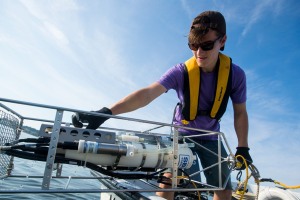PROVIDENCE, R.I. [Brown University] — On a Friday afternoon in July, amid a thick heat that had settled over Washington, D.C., rising Brown junior John Michael Slezak found some time to unwind with a book under a shade tree on the National Mall. As an intern with the Nuclear Threat Initiative, a global security NGO focused on reducing nuclear and biological threats, Slezak is spending his summer immersed in complex global issues.
“Thinking all week about how a nuclear war would start and then what happens as a result can be taxing,” said Slezak, who is working on NTI’s Science and Technical Affairs team. “I go to the Mall to read anytime I have a break — I am always out reading on the National Mall.”
That’s not to say his reading material is the latest summer beach read.
Slezak, who is concentrating in mathematical physics at Brown with plans to declare a second concentration in international and public affairs, ventured to Washington to join NTI in June. As part of a role developing written communications to better engage the public on critical nuclear and cybersecurity issues, his responsibilities include poring over and synthesizing complex data and source materials, with a focus on topics like the impact of artificial intelligence on nuclear weapons systems.
“The Nuclear Threat Initiative has in prior years produced reports on the modernization currently happening in the United States on cybersecurity and nuclear weapons systems,” Slezak explained. “They’ve done a piece on misinformation in nuclear crises. What I am trying to do is take all of these issues together and write one comprehensive look at artificial intelligence in nuclear systems.”
He also co-created a summer book list — some of that National Mall reading! — for the public to learn more about the nuclear and biosecurity fields, and has been combing through studies depicting outcomes from nuclear war, condensing the information into an easy-to-use, publicly accessible format: “I am looking at scientific articles and research declassified from the U.S. Department of Defense, trying to make it more understandable, and synthesizing it into a one-pager for policymakers and other audiences,” he said.
Slezak said that taken together, the projects for NTI are helping him sharpen his academic focus at Brown and providing an even clearer idea of what he’d like to do professionally. He said he envisions a role working with policymakers on scientific issues: educating them on critical issues like climate change and helping them make evidence-based policy decisions.
“I want to be able to take other people’s research and convey it effectively, whether to the general public or to policymakers to help enact legislation,” he said. “There is a lot of scientific research done and there is a lot of policy written — however, there is also a lot of disconnect when scientists meet policymakers. I want to fill the gap of being able to understand the science and the technical side, while also being able to negotiate and talk to politicians in their native language of policy and politics.”
